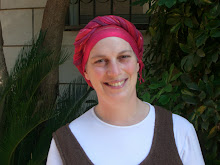 Today, for the first time in a long time, it rained. As the grey clouds gathered in the morning, I realised that I didn't know what brachah to say on the yoreh, the first heavy rainfall after the summer in Israel.
Today, for the first time in a long time, it rained. As the grey clouds gathered in the morning, I realised that I didn't know what brachah to say on the yoreh, the first heavy rainfall after the summer in Israel.After searching through many siddurim, I found it in the Rinat Yisrael, a beautiful paragraph of thanks for rain after a long dry spell. The brachah opens with the phrase:
"We thank you, Hashem, for each and every drop that You brought down for us."
When the rains came, I was in the car. I parked, and listened to the noise on the roof, and watched the car windows become flooded and streaked from the rain mixing with the dust and sand that had settled there over the last many dry months. I took out my siddur and prayed.
I am especially grateful that I am in Israel and able to say this brachah, and there is a genuine gratitude for rain in this part of the world, whether people are the prayerful type or not.
What struck me with this tefilah, though, were the words "al col tipah v'tipah", "for each and every drop". This choice of phrase brings our gratitude into sharp focus. Instead of seeing rain, we appreciate each drop. What other areas of my life can I apply this to, where I typically see the broad picture and miss the tiny elements of blessing?
May we learn to count each and every drop of blessing in our lives; may the Land of Israel be blessed with plentiful rain in the right season.
(Photo credit: http://commons.wikimedia.org/wiki/File:Rain_on_grass2.jpg)
(You can see the text of the tefilah here: http://www.kipa.co.il/ask/show/74833)





